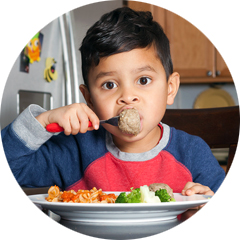Kids & Food: Creating a Positive Relationship
Even for kids, the relationship with food can become complicated—or at least occasionally muddled. Fundamentally, food is about getting the proper nutrients to help fuel and energize our bodies. Children need food to grow and develop, and making healthy choices at an early age helps kids learn to make good decisions later in life. And don’t forget: Food can be fun! Meals and snacks can be a social activities that bring family and friends together.
Every child approaches food differently, and as a parent, you may need to try a few different techniques before your child begins to develop healthy eating habits. Here are a few guidelines to encourage your kids to develop healthy, positive relationships with food.
Set a good example with your own relationship with food
Kids will pick up cues from their parents and caregivers, so it’s especially important that adults demonstrate positive relationships with food. Set an example by eating healthfully, the way you’d like your child to eat: lots of vegetables, lean proteins, whole grains and fresh fruit. If your kid sees you enjoying brown rice, salmon and a hearty serving of steamed vegetables, they’ll be more open to those foods, too.
You can create a positive environment around food when you lead by example. During mealtime, listen to your own hunger cues and talk about them with your kid. How do you know when you’re hungry or when you’re full? If you’re always going for seconds before you’ve finished your vegetables, your kid will want to as well. Talk about what you’re eating and why: We eat vegetables because they provide fiber, vitamins and minerals that make our bodies feel strong. Lean proteins help muscle development. Your mindful eating will translate to your kid’s mindful eating, so remember to demonstrate it each mealtime.
Teach your kids the difference between hungry and full
The clean plate strategy generally doesn’t encourage a positive relationship with food. In fact, it often works against healthy eating. Part of your child’s eating development is learning when they are hungry, when they are full and eating accordingly. Remind your kids that just because food is in front of them doesn’t mean they have to eat it. Encourage them to listen to their bodies, eat healthy food when they’re hungry and stop eating when they’re full.
Don’t use food (like dessert) as a reward

When trying to get your kids to eat vegetables, you may be tempted to leverage food they like as a reward. However, this method can hurt their relationship with food. Using dessert or another unhealthy food as a reward may actually make your kid want it more. You’re showing them that dessert is something to be sought after. Additionally, you may be stuck giving your kid dessert every night, which isn’t the healthiest option.
An alternative to this reward method is to offer healthy foods, such as vegetables, frequently and without too much pressure. If your child is not eating green beans when they’re plated with the rest of their meal, try serving them as an appetizer. And, of course, eat your own vegetables—your kid will notice!
Certain activities shouldn’t always mean certain foods
From a lollipop after a haircut to a cake pop at Starbucks, kids will begin to associate certain activities and places with treats. Break the habit by offering them healthier alternatives, and let them know ahead of the visit that the treat will be skipped this time or saved for another occasion. Setting your kid’s expectations beforehand with open communication is vital for their healthy eating.
Don’t make any food completely off-limits

It’s tempting to label foods as “good,” “bad,” “healthy” or “unhealthy,” but evaluating food isn’t black and white. All food can be incorporated into a healthful diet; the key is portion control. Show kids that high quality foods, such as vegetables, fruit, whole grains and lean proteins, should be consumed more often. Lesser quality foods like candy and movie popcorn can be incorporated into the diet, just less frequently.
When it does come time for a treat, enjoy it! Recognize that treats can be a part of your family’s diet, as long as they are enjoyed in moderation. If you make something completely off-limits, your kid may desire it more. Encouraging moderation can actually prevent your child from binging on treats and junk food at parties or during the holidays.
Every meal doesn’t have to be perfect
It’s OK to have pizza night. It’s OK to have birthday cake at a friend or family member’s celebration. It’s OK to indulge from time to time. Just keep portions and frequency in moderation.
You’re teaching your child a lifetime of healthy eating habits, which starts with how they approach their plate. When you model healthy eating, create a positive mealtime environment and have open communication, your child will develop healthy eating habits and a positive relationship with food.

